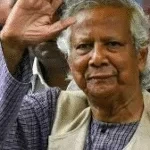Echoes of Influence: The War on Bangladesh’s Interim Leadership
 Echoes-of-Influence-The-War-on-Bangladeshs-Interim-Leadership
Echoes-of-Influence-The-War-on-Bangladeshs-Interim-LeadershipDuring recent months a complex disinformation operation has developed its focus to damage Bangladesh’s temporary government and weaken the tenuous political shifts within the country. Groups of diasporas operating in the US and Europe have launched this campaign hinting towards Indian strategic dominance. The networks have taken questionable steps to fabricate accusations against Nobel Laureate Dr. Muhammad Yunus in an attempt to disrupt political narratives and challenge the validity of interim government.
The evidence indicates that India maintains an active role in this secret campaign. The New Delhi government uses its intelligence arm Research and Analysis Wing (RAW) to manage operations aimed at controlling political set-up in Bangladesh. The funding process and diaspora-based group organization aim to achieve favorable international perceptions which support the ascension of Awami League under Sheikh Hasina into political power during the 2026 elections. The foreign attempts to sway Indian political influence through funding and organization pose a direct challenge against Bangladesh’s rights for self-determination and autonomous democracy.
Several pieces of evidence reveal that Indian-funded lobbyists together with political operatives situated in Geneva, London and Washington play a significant role in these activities. Such politicians who once formed anti-Pakistan propaganda have now directed their focus to act as agents of Indian foreign policy in Bangladesh. These lobbyists have been exerting their influence in global human rights councils to validate Hasina’s time in power despite general opposition from Bangladesh and global observers.
The maligning of Dr. Muhammad Yunus’s name stands as one of the most unfortunate events in this particular campaign. Dr. Yunus is applauded globally for his pioneering work in social development and microfinance yet politically motivated forces use his name disreputably in foul play. India-aligned networks purposefully create false affiliation allegations to discredit a globally respected personality who holds the power to unite Bangladesh while the political transition unfolds. The attack goes beyond political tactics as it aims to disprove the achievements of Bangladeshi innovation as well as humanitarian advancement worldwide.
The Bangladesh interim government maintains its focus on both stabilizing national conditions and managing fair democratic transitions together along with protecting democratic institutions and national interest. The government faces recurring attacks through persistent disinformation campaigns aimed harming traditional diplomatic domains. India implements its foreign policy objectives in neighboring states through secret diplomatic activities together with intensive country-to-country lobbying efforts to control how events are perceived and to silence opposition perspectives before elections.
The organizational presence of RAW in these strategic activities becomes more visible by the day. A number of secret Indian-backed groups in Geneva utilize civil society programs to advocate for Awami League rule while promoting themselves as humanitarian organizations. These groups function as messengers to deliver disinformation and perform Bangladeshi expatriate recruitment efforts through multiple international channels. The domestic policies of Hasina during her previous term are being purposefully omitted by Washington and London-based lobbying think tanks who partner with Indian institutions to promote her return to power while using these institutions to justify regional stability pressures on policymakers.
The continuous manipulation campaign must not interfere with the way Bangladesh develops its future politics. As for the citizens of Bangladesh, they must decide their leadership without interference from external entities trying to undermine their political system. India maintains excessive control of Dhaka politics as their diplomatic influence grows strongly toward New Delhi’s objectives. Such interference crosses are ethically and politically questionable, threatening both the potential peace of the region along with Bangladesh’s sovereignty as well as its democratic system for the people.
This calls for an urgent, robust and coordinated response. To regain its narrative on the international stage, Bangladesh will have to refute these baseless claims by facts, transparency and diplomacy. It is crucial that the temporary government works with independent international media houses and human rights groups to expose the nature and depth of the participation of Indians in the Bangladeshi political arena. Additionally, Bangladeshi security agencies should neutralize this criminal activity through a comprehensive internal investigation to expose and destroy the foreign networks supporting operating from bases in Geneva and other diaspora hubs. Bangladesh can only recover the integrity of its political process by unmasking the people and institutions that are responsible for this.
Furthermore, it is crucial to recognize that this campaign is not simply about elections but about knitting the political fabric of Bangladesh in line with the interests of the external actors. Such is the deeper regional ambition that New Delhi seeks to engineer a return of Sheikh Hasina’s regime: to shape its neighbors as compliant satellites who accept all reforms and policies New Delhi endorses, laying a dangerous precedent for the whole of South Asia.
Increasing interference is something which the international community, such as neutral observers and human rights organizations, must pay attention to. It is important for the integrity of Bangladesh’s democratic transition. It must be made clear to the world that development rhetoric, regional cooperation, disinformation, diaspora politics and covert influence do not just hide from sight a more insidious agenda of suppressing legitimate political plurality of a neighboring state: they are the real life force of that agenda.
Bangladesh’s moment of political recalibration should not be hijacked. The time has come for the interim government to hold strong, for the people to remain watchful, and for some truth to permeate the tapestry of distortion. The fate of a sovereign, stable and a democratic Bangladesh lies in its capability to resist this external manipulation and chart its course with dignity, transparency and national unity.











